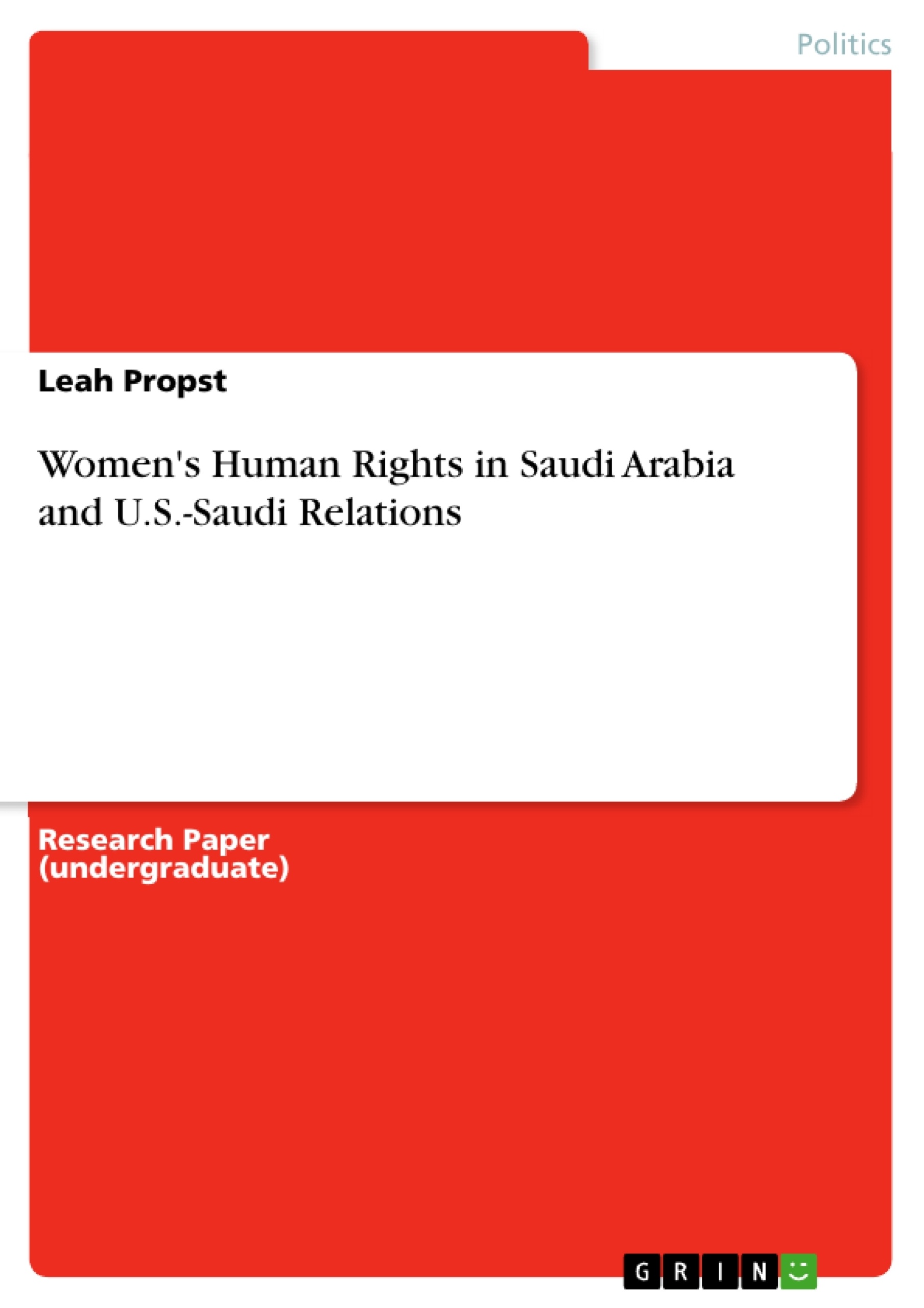The Kingdom of Saudi Arabia has faced criticism from the world community for perceived human rights violations. At the same time, the United States imports one million barrels of oil from the Kingdom every day, and provides protective and military services there. The current research focuses on conditions for women in Saudi Arabia as well as the importance of a working economic relationship between the US and Saudi Arabia and American public opinion on the topic.
Literature was collected to explore the topic of human rights- what they are and when people really have them. Research was also studied about the circumstances that women in Saudi Arabia are subjected to daily and the effects that these circumstances have on women's social capital and ability to flourish, especially in regard to education. A third factor considered when the literature was chosen was US-Saudi relations, with an emphasis on how much is at stake in the relationship, and how US interaction with Saudi Arabia might benefit those who traditionally suffer in the current conditions of the Kingdom.
It was found that human rights may best be measured by their enjoyment, not through the traditional measurement of enacted laws and policies. Studies conducted in Saudi Arabia show that women in that nation do not enjoy basic human rights as defined by the United Nations, as well as by the traditional American value system. The studies reviewed also reveal that the US cutting ties with Saudi Arabia will be a difficult task at best, and may even be detrimental to the well-being of that nation's marginalized groups. Further study is needed to determine if American public opinion points to a desire for the US to separate itself from Saudi Arabia due to differing policies regarding human rights. The current research aimed to gauge American public opinion on US-Saudi relations to determine if there exists the desire to cut ties with Saudi Arabia on human rights grounds.
Inhaltsverzeichnis (Table of Contents)
- Introduction
- Abstract
- Literature Review
- Defining Human Rights
- Perceived Rights of Women in Saudi Arabia
- Gender-Segregated Education
- Method
- Results
- Discussion
- Limitations
- Future Research
Zielsetzung und Themenschwerpunkte (Objectives and Key Themes)
This research aims to examine the United States' relationship with Saudi Arabia, American public awareness of US-Saudi relations, and Americans' understanding of social conditions for women in Saudi Arabia. It explores the complexities of human rights measurement, particularly in the context of Saudi Arabia's socio-political landscape. The study also investigates the potential impact of US-Saudi relations on women's rights and social capital in the Kingdom.
- Human rights measurement and enjoyment
- Women's rights in Saudi Arabia
- US-Saudi relations and their impact on women's rights
- American public opinion on US-Saudi relations
- The influence of education on women's rights perceptions
Zusammenfassung der Kapitel (Chapter Summaries)
The introduction sets the stage by discussing the United States' reliance on Saudi oil and the stark contrast with women's limited rights in the nation. The abstract provides an overview of the research focusing on women's conditions in Saudi Arabia, US-Saudi economic relations, and American public opinion on the subject. The literature review delves into defining human rights, examining the perceptions of women in Saudi Arabia regarding their rights, and analyzing the impact of gender-segregated education on women's opportunities.
The chapter on "Defining Human Rights" explores the concept of human rights beyond legal frameworks, emphasizing the importance of individuals' ability to enjoy their rights in practice. The chapter on "Perceived Rights of Women in Saudi Arabia" examines a study by Al-Khateeb (1998) that investigates Muslim women's views on equality in Riyadh. This research reveals complexities surrounding women's acceptance of traditional roles and the role of religion in shaping their perceptions.
The final chapter explored in this preview, "Gender-Segregated Education," examines the impact of segregated education on women's opportunities in Saudi Arabia. The study by Baki (2004) highlights the limitations imposed on women's access to education and employment due to social and political factors. Additionally, research by Al-Daghri et al. (2014) indicates a correlation between perceived stress and health issues among female university students in Saudi Arabia, highlighting the potential consequences of gender inequality on women's well-being.
Schlüsselwörter (Keywords)
This research revolves around the intersection of human rights, women's rights, and US-Saudi relations. Key terms include human rights enjoyment, social capital, gender-segregated education, women's rights perceptions, public opinion, US-Saudi economic relationship, and Saudi Arabia's socio-political context.
What are the main human rights challenges for women in Saudi Arabia?
Key challenges include limited legal autonomy, gender-segregated education, and social restrictions that impact women's social capital and ability to flourish.
How does the US-Saudi relationship affect human rights discussions?
The US relies on Saudi oil, while providing military support. This economic tie creates a complex dilemma between national interests and the promotion of American values regarding human rights.
What is the impact of gender-segregated education in Saudi Arabia?
Studies show it limits women's access to certain employment sectors and can correlate with higher perceived stress among female university students due to social limitations.
How should human rights be measured according to this research?
The research suggests that human rights are best measured by their actual enjoyment and practice by individuals, rather than just by enacted laws and policies.
Would cutting ties with Saudi Arabia improve human rights?
The study indicates that cutting ties might be detrimental to marginalized groups within Saudi Arabia, as US interaction can sometimes provide a beneficial influence.



